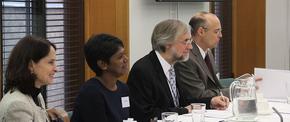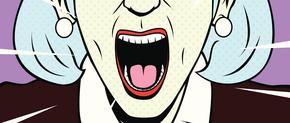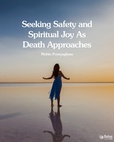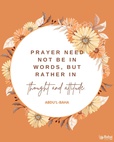The views expressed in our content reflect individual perspectives and do not represent the authoritative views of the Baha'i Faith.
Several of my married friends now find themselves in the “sandwich generation” — working full time, parenting teenagers, and looking after aging parents. This has to be one of the hardest times of life!
In some cases, the demands of taking care of their aging and even abusive parents have become increasingly difficult and unreasonable for them, with little appreciation from those aging parents regarding the sacrifices they’re making, and no desire to consult on ways to make things better. My friends feel powerless and confused over what to do, and several have wondered what wisdom the Baha’i writings could contribute that might help improve such difficult and fraught relationships.
RELATED: Can We Inherit – and Heal – Family Trauma?
Abuse within the family is a deeply painful and complex issue that can leave individuals grappling with their obligations and responsibilities, especially when it involves a parent. The Baha’i Faith teaches central principles of love, compassion, and forgiveness , but how do these principles apply in situations involving an abusive parent? What does it mean to honor an abusive parent? Does it mean you have to put up with their abuse? Does it mean you need to visit them, take care of them in their old age, or stay in an abusive household? These are some of the questions I’ve been asked, so I’d like to share some of my thoughts on this important topic, as I try to help navigate them through those tough decisions.
First, as a general principle, the Baha’i teachings ask us to honor and serve our parents. Baha’u’llah, the prophet and founder of the Faith, made it clear when he wrote:
Should anyone give you a choice between the opportunity to render a service to Me and a service to [parents], choose ye to serve them, and let such service be a path leading you to Me. This is My exhortation and command unto thee. Observe therefore that which thy Lord, the Mighty, the Gracious, hath prescribed unto thee.
This exhortation seems pretty clear — and equally hard to let go of! Clearly, however, Baha’is do not allow themselves to be the object of cruelty or allow it to happen to others. Baha’u’llah wrote:
The friends of God must be adorned with the ornament of justice, equity, kindness and love. As they do not allow themselves to be the object of cruelty and transgression, in like manner they should not allow such tyranny to visit the handmaidens of God. He, verily, speaketh the truth and commandeth that which benefitteth His servants and handmaidens. He is the Protector of all in this world and the next.
Balanced with this guidance, the Baha’i Faith also places a strong emphasis on the importance of family unity, love, and compassion. Baha’is try to foster harmonious relationships within their families, and treat their parents with respect, kindness, and compassionate understanding. In light of this principle, the National Spiritual Assembly of the Baha’is of the United States has issued guidelines for those who suffer from abusive family situations:
While one may have enormous sympathy for how destructive patterns of behavior originate and that they are often due to the abuser having been abused earlier in life, such compassionate understanding should never be used to excuse or justify misconduct, or to bestow undue sympathy for its consequences, as that only perpetuates the problem and may extend it into the following generation.
Consultation forms the cornerstone of Baha’i decision-making. The Baha’i teachings encourage engaging professional help or legal intervention when dealing with abusive situations. In fact, seeking guidance from trusted friends, Baha’i Institutions, counselors, therapists, and other authorities can be a responsible and necessary course of action to ensure safety and healing and often proves invaluable in navigating complex family dynamics that involve abusive situations.
In cases of abuse, the safety and well-being of all family members, including the victim and any others who may be affected, are of paramount concern. Baha’is are obliged to protect themselves and others from harm. The U.S. National Spiritual Assembly guidelines say that compassion and understanding go a long way:
All those who abuse do not fit the same mold. While some are extremely resistant to intervention or treatment others may be able to accept responsibility for their behavior. Some individuals who abuse may live with acute, and often hidden, feelings of shame and self-loathing. Despite the suffering they bring to others, they may be in need of compassion and forgiveness themselves and may hope for rehabilitation with intervention and assistance. These individuals would be in need of a supportive, loving, non-judgmental community as they strive to overcome abusive behaviors. However, this should not be interpreted to mean that an individual who abuses may shift responsibility for any lack of progress to his or her family members, community, or Baha’i administrative institutions.
The Baha’i teachings also emphasize the importance of maintaining healthy boundaries in relationships. Setting boundaries is a way to protect oneself from further harm while striving to maintain a sense of dignity and self-respect as you identify what you are and are not willing to do. In reaching your decision, the democratically-elected Universal House of Justice, the global leadership body of the world’s Baha’is, offered this counsel to one Baha’i with abusive parents:
The House of Justice has noted with sympathetic understanding the despair to which you have been driven by the recurrent incidences of cruelty and neglect you have been made to endure … Under the circumstances you have so amply described, you should feel free to separate yourself from them to the extent possible. Their behavior towards you grossly violates the norms of parental relationship with a child, and this fact can be taken into consideration if and when you decide to get married.
It helps to understand that we can never set another person’s boundaries; but only do so for ourselves, praying to God for the patience and determination to stick to those boundaries.
There are ways you can be kind to an abusive person now without having contact — particularly through prayer. This will help in two ways — it will help both you and them.
RELATED: Trauma: How Can We Heal Our Wounded Souls?
Baha’is are encouraged to strive for forgiveness in their lives. However, forgiveness in the context of abuse is complex. Forgiving an abusive parent does not mean condoning or tolerating their abusive behavior. It means letting go of feelings of anger and resentment, which allows us to heal personally. The Universal House of Justice gave this advice to another individual Baha’i:
Such an attitude [of forgiveness and insight into their actions] does not preclude your being prudent in deciding upon the appropriate amount of contact with your parents. In reaching your decision you should be guided by such factors as their degree of remorse over what they inflicted on you in the past, the extent of their present involvement in practices which are so contrary to Baha’i Teachings, and the level of vulnerability you perceive within yourself to being influenced adversely by them.
When we find it hard to forgive, we can pray for their forgiveness. Here’s a Baha’i prayer we can say for parents:
O Lord! In this Most Great Dispensation Thou dost accept the intercession of children in behalf of their parents. This is one of the special infinite bestowals of this Dispensation. Therefore, O Thou kind Lord, accept the request of this Thy servant at the threshold of Thy singleness and submerge his father in the ocean of Thy grace, because this son hath arisen to render Thee service and is exerting effort at all times in the pathway of Thy love, Verily, Thou art the Giver, the Forgiver and the Kind!
There are no easy answers, and while reconciliation with an abusive parent may be the ideal, it is not always possible or safe. In some cases, a person may need to distance themselves from the abusive parent to protect their own well-being. Reconciliation should ideally occur within the context of professional intervention, healing, and genuine cessation of the abusive behavior. With such clear guidance from the Baha’i teachings, I am grateful!
















Comments
Sign in or create an account
Continue with Googleor